5 KEY FACTS ABOUT ADDICTION RECOVERY BRINGING HEALTHCARE TO STUDENTS
LOSE WEIGHT WITHOUT SURGERY

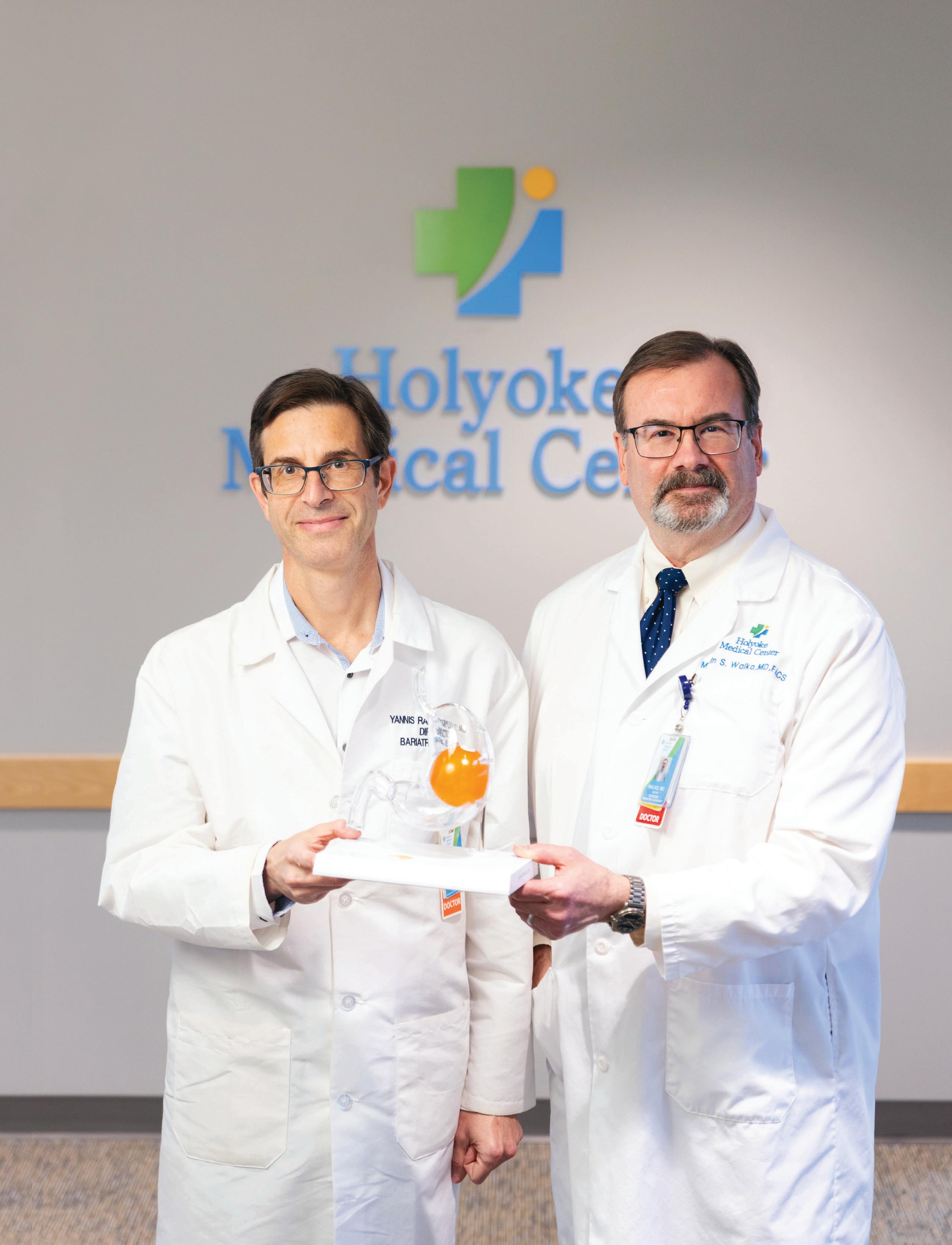
SUMMER 2023 I HOLYOKEHEALTH.COM A PUBLICATION OF HOLYOKE MEDICAL CENTER
WELLNESS EVENTS
WEIGHT MANAGEMENT INFORMATION SESSIONS
Holyoke Medical Center’s Weight Management Program offers monthly information sessions to discuss one of the safest, highest-quality and most effective weight loss programs available. Our program has helped members of our community lose thousands of pounds and keep them off! To learn more, visit www.HolyokeHealth.com/WMP or scan the code at left.

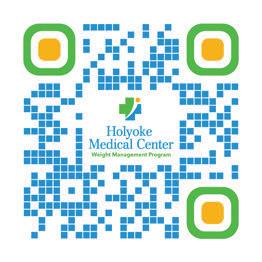
QUIT SMOKING SUPPORT SERVICES
Smoking cessation counselors are available to give you the information and support you need to get through one of the most important changes of your life. For more information or to preregister for a workshop or individual counseling, call 413.534.2739 or email smokefree@holyokehealth.com
HOLYOKE MEDICAL CENTER FARMER’S MARKET
Every Wednesday | June 14 to October 25 | 575 Beech Street, Holyoke
MANAGING DIABETES
Managing diabetes is a journey, but not one you have to make alone. Sign up today for a three-part series to discover what you can do to better manage your diabetes. Topics will include:
• Your experience with diabetes
• Monitoring your blood sugar
• Healthy eating and activity
• Long-term management
Classes will take place at the Greater Holyoke YMCA from 5:30 to 7 p.m. on:
August 2, 9 and 16
September 6, 13 and 20
October 4, 11 and 18
To register, call 413.535.4732
CONTENTS
3
4
RIVER VALLEY COUNSELING
CENTER 8TH ANNUAL GOLF TOURNAMENT
Friday, September 15 East Mountain Country Club Westfield, MA
Join us for a good time while supporting RVCC’s children’s and youth mental health services.
Shotgun start at 10:30 a.m. $125 fee includes golf, cart, lunch and dinner.
For more information or to register or sponsor online, visit www.rvccinc.org/golf. Questions? Call 413.534.2579 or email laroche_janet@holyokehealth.com.
6
HEALTHY HABITS News and information for better health.
SEPTEMBER IS RECOVERY MONTH Facts you should know about addiction.
PROVIDING HEALTHCARE IN HOLYOKE SCHOOLS Teen Clinics help students meet physical and mental health needs while supporting education.
8
LOSE WEIGHT WITHOUT SURGERY HMC offers a procedure that helps people with obesity make lasting changes.
10
WELCOMING NEW MEDICAL PROVIDERS Meet 17 clinical experts who have joined HMC’s team.
On the Cover: Yannis Raftopoulos, MD, PhD (left), and Martin Walko, MD, hold a model of a gastric balloon weight loss treatment, which is placed in the stomach in a nonsurgical, minimally invasive procedure.
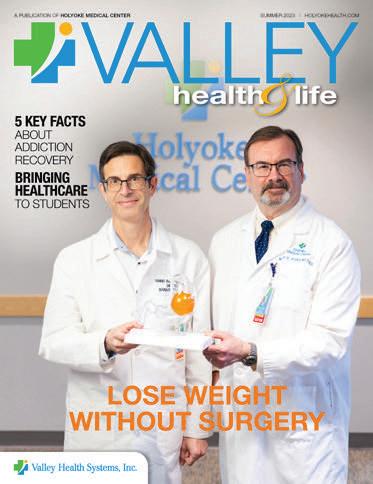
12
DELIVERING HANDS-ON HELP
CHAPLAINS: A SOURCE OF CALM AND COMFORT Interfaith volunteers offer blessings to patients and staff alike. 14
15
A doctor of nursing practice works to improve his homeland through on-site healthcare and education.
ONE YEAR OF COMMUNITY BENEFITS How HMC improves area health through programs and services.

15 ● HOLYOKE MEDICAL CENTER 575 Beech Street, Holyoke | 413.534.2500 ● HOLYOKE MEDICAL GROUP 15 Hospital Drive, Holyoke | 413.535.4800 ● HOLYOKE VNA HOSPICE LIFE CARE 575 Beech Street, Holyoke | 413.534.5691 ● RIVER VALLEY COUNSELING CENTER P.O. Box 791, Holyoke | 413.540.1234
2 SUMMER 2023
HEALTHY HABITS
FOR YOU AND YOUR FAMILY
HEALTHY LIFESTYLE, BETTER MEMORY
Six factors that constitute a healthy lifestyle have been associated with slower memory decline, according to a decade-long study of adults 60 and older. A healthy diet has the strongest protective effect, followed by cognitive activity (such as playing challenging games) and regular exercise. But other important ingredients in the mix are an active social life, not smoking and avoiding alcohol.
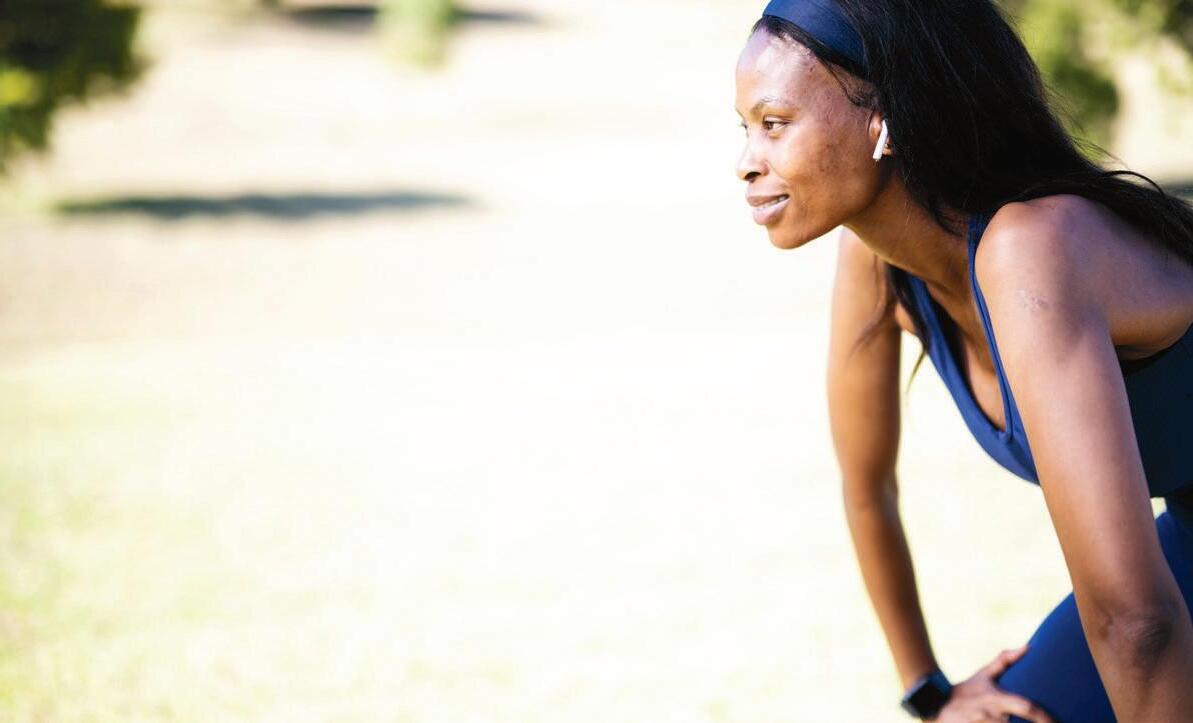
—The BMJ
The percentage of childhood asthma cases nationwide linked to the use of gas stoves, which are found in more than a third of U.S. households.

—International Journal of Environmental Research and Public Health
DISTRACTED RUNNERS
FASTING COULD HELP DIABETES
An intermittent fasting diet—for example, eating only during an eighthour period—may lead to remission of Type 2 diabetes. During a recent three-month study, 55% of participants saw their average blood sugar levels drop below the diabetes-defining line and almost 90% reduced or discontinued their diabetes medication.

—The Journal of Clinical Endocrinology & Metabolism
PRUNES PROTECT BONES
Wrinkly prunes are known for keeping you regular, but a recent study finds they can also help prevent bone loss in postmenopausal women. Researchers think that the fruit’s vitamin K, phenolic compounds and minerals offer protection against osteoporosis.
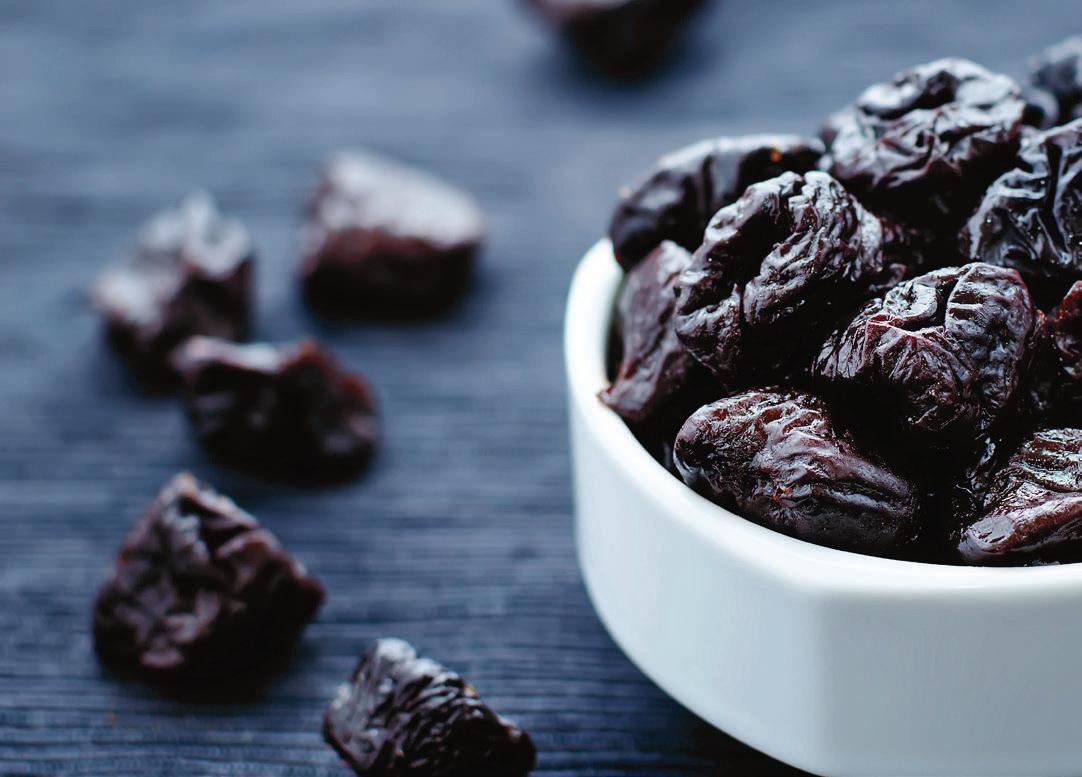

—Penn State University
The key to better running might have more to do with new earbuds than new kicks. Runners in a study who distracted themselves by listening to music and focusing on sights around them had better endurance than those who tuned into their bodies.
—Journal of Motor Learning and Development
NO-SCROLL ZONE
Awake at night? Don’t check your news feed. Any kind of consistent exposure to light—from a cell phone, streetlight, left-on TV—during the night, even during sleep, was linked to higher risks of obesity, high blood pressure and diabetes in a study of older adults. Researchers suggest keeping rooms dark, night-lights dim and close to the floor—and cell phones put away.
—Northwestern University

w
13
VALLEY HEALTH & LIFE 3
SEPTEMBER IS RECOVERY MONTH
5 FACTS YOU SHOULD KNOW ABOUT ADDICTION
MAYBE YOU KNOW someone who would like to stop or reduce their use of alcohol or substances. Maybe that person is you. Whomever you’re concerned about, that individual is not alone: Problems with alcohol or substance use can affect anyone regardless of age, race or income level— and often do.
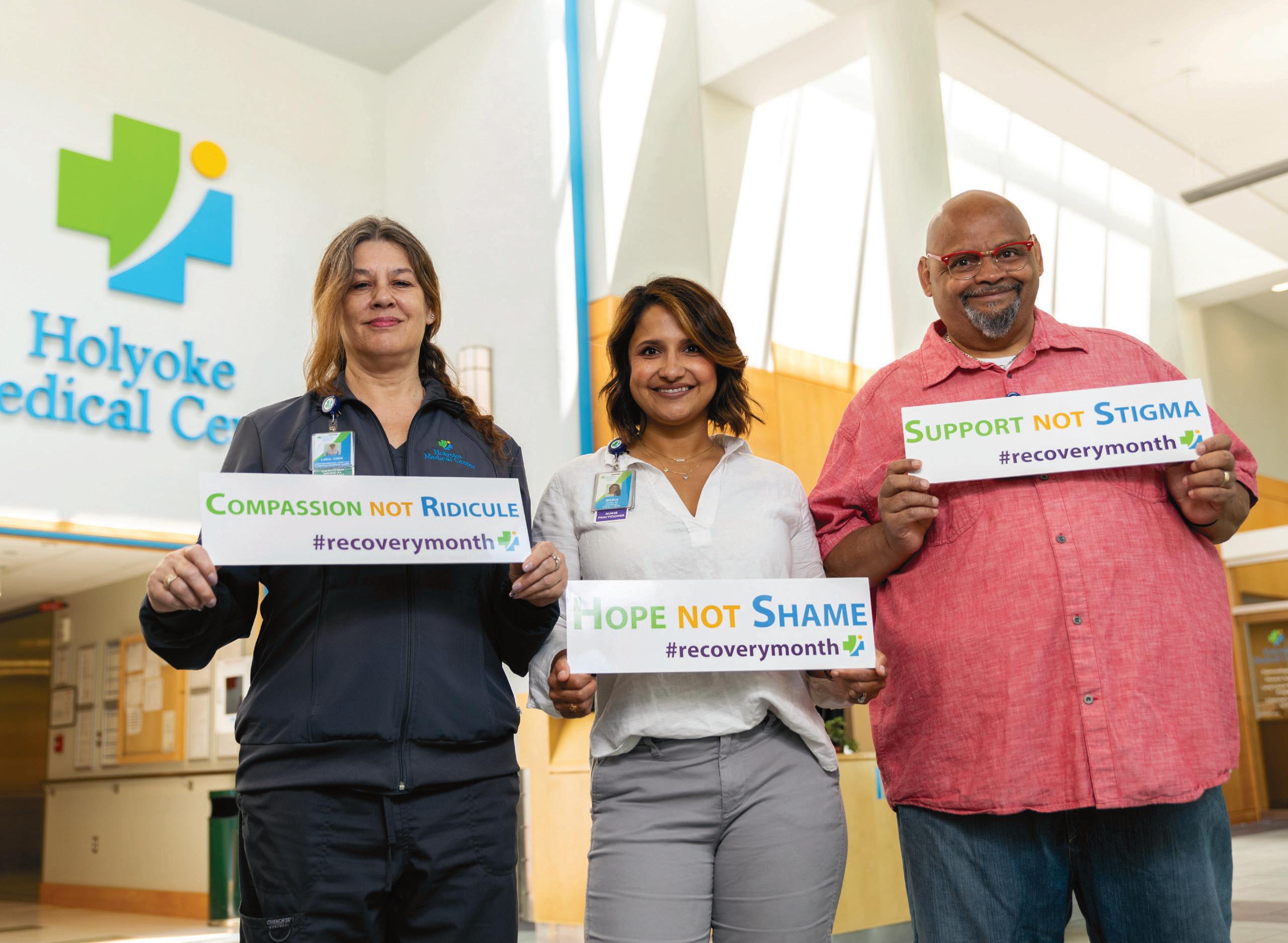
Yet misconceptions abound despite
the prevalence of use-related issues. The following facts can add clarity and steer you or a loved one toward a healthier place.
1 HELP IS AVAILABLE
Whether use is causing health or personal problems for you or a loved one, help is available through Holyoke Medical Center (HMC).
4 SUMMER 2023
Providers of recovery support include (from left) Lisa Polidoro, Medical Assistant; Maria Quinn, Director of Addiction Treatment and Recovery Support; and Dennis Gonzalez, Recovery Coach.
“We have addiction and recovery services throughout the organization,” says Maria Quinn, MSN, PMHNP-BC, Director of Addiction Treatment and Recovery Support at HMC.
Care from a team that includes nurses, recovery coaches and a recovery support coordinator extends from the Emergency Department to patients admitted to the hospital and to the outpatient Comprehensive Care Center located on the hospital campus.
2
ADDICTION IS NOT THE SAME FOR EVERYONE
Some individuals are able to go many years without having any negative impacts from their drug or alcohol use; others gradually lose things that they once valued such as family, health and friendships.
“We address a variety of challenges that vary from person to person depending on the substance, amount and frequency of use and degree of support a person has—or doesn’t have,” Quinn says. “A lot of issues relate to stigma and shame associated with consequences such as harmed relationships or job loss. But many people are also dealing with substanceor alcohol-related health problems such as liver damage, pancreatitis, memory issues, skin and soft tissue infections.”
3
HARM REDUCTION IS NECESSARY
“We’re very much patient-led,” Quinn says. “We talk about goals and listen to where patients are. If they’re not ready to stop but are willing to start a conversation, we can capitalize on that.”
An example of a well-known harm reduction strategy is wearing your seat belt; it reduces the risk of injury or death in the event of an accident. Harm reduction for individuals who drink or use drugs has a similar goal.
Harm reduction education accepts that some individuals are not in a place where they are ready—or want—to stop using drugs or alcohol. In such cases,
HMC provides support to reduce the risks associated with continued use.
Education may include information about syringe access programs, safer injection practices, drinking water between drinks containing alcohol, taking vitamins that are not well absorbed when drinking alcohol or not mixing alcohol with sedating medications.
Quinn emphasizes that harm reduction is not encouraging someone to continue drinking or using drugs but is a way to support and acknowledge where a person is on the change continuum. Harm reduction helps keep people alive, allowing them the opportunity to work toward recovery.
4
FINDING SUPPORT IS KEY
“Support and involvement from family and loved ones is so important,” Quinn says. “The tough love model is not as effective as we once thought it was. It’s difficult to work toward recovery if you feel nothing is waiting for you.”
Families and loved ones also benefit from support, and the HMC team provides resources on community support that allow loved ones to not feel alone in this process. “Addiction is one of the few illnesses where people don’t always wrap you up in love and support,” Quinn says. “Families often feel very alone and don’t want to share what they are going through because they don’t want to hear the judgmental statements that often come regarding their loved one struggling with addiction.”
5
MEDICATION CAN HELP
The HMC team also provides education about treatment options, including clarifying common misconceptions around medications.
“We often hear that people believe taking medications for opioid use disorder or alcohol use is ‘just replacing one drug with another,’ which is untrue and stigmatizing,” Quinn says. Benefits of medications for alcohol or opioid use
COMING: AN OVERDOSE PREVENTION EVENT
In advance of Overdose
Awareness Day (August 31), Holyoke Medical Center (HMC) invites the community to join recovery support experts on August 23, 2023, at 5:30 p.m. for an overdose prevention training event with distribution of Narcan (a medication that quickly reverses an opioid overdose) led by Tapestry Health. Representatives from Learn 2 Cope, a peer-led support network that offers education, resources and hope for family members and friends who have loved ones affected by substance use, will be available to answer questions and provide additional resources. Call 413.534.2789 or visit www. HolyokeHealth.com/events to register.
Follow us on social media. Throughout #recoverymonth, HMC will feature different staff and community members showcasing concepts such as:
• Support not stigma
• Hope not shame
• Empathy not judgment
• Compassion not ridicule
• Advocacy not assumptions
• Encouragement not detachment
• Connection not isolation
include easing withdrawal, decreasing cravings, dampening the effects of opioids or making use less enjoyable.
“Regardless of the pathway you choose, whether it’s medications, support groups, using in moderation or complete abstinence, if it allows you to fully participate in life in a way that you feel good about, then continue on,” Quinn says. “Hope is a powerful thing.”
To learn more about the Comprehensive Care Center and recovery services at Holyoke Medical Center, call 413.535.4889
VALLEY HEALTH & LIFE 5
PROVIDING HEALTHCARE
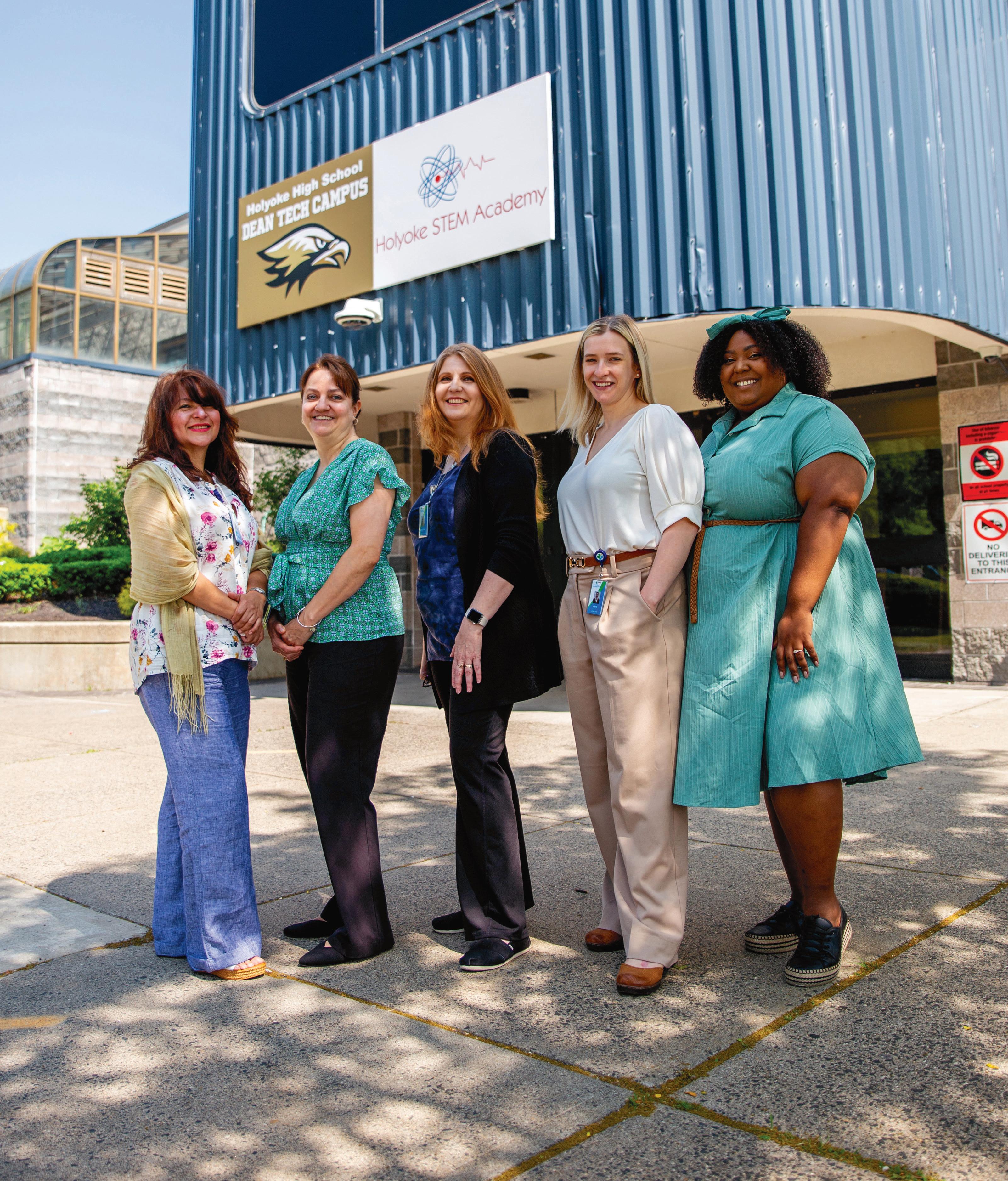
IN HOLYOKE SCHOOLS
TEEN CLINICS HELP STUDENTS MEET PHYSICAL AND MENTAL HEALTH NEEDS WHILE SUPPORTING EDUCATION.
Teen Clinic providers include (from left) Karina Castro, CHW; Tamela Rodrigues, FNP; Barbara N. Manning, LMHC, ATR; Kate Harper, MS; and Yuraida Brown.
6 SUMMER 2023
SCHOOLS ARE NOT just centers for learning anymore. They’re also critical supports for students and families, including through physical and mental health services, according to the Centers for Disease Control and Prevention.
That’s become even more true since the COVID-19 pandemic, especially with respect to mental health, says Alexa Mignano, LMHC, Director of SchoolBased Clinical Services at River Valley Counseling Center (RVCC). “It’s become increasingly clear that we need to attend to students’ mental health needs for them to function well in all areas of life,” Mignano says.
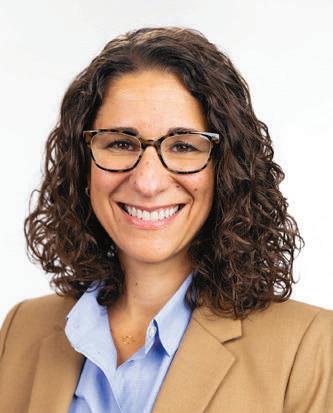
For decades, RVCC has provided students with mental and physical health services through Teen Clinics, or schoolbased health centers, at Holyoke High School North, Dean Campus and William R. Peck Middle School. The Teen Clinics are now managed as a collaborative partnership between Holyoke Medical Center and RVCC. The clinics provide quality, comprehensive and convenient healthcare services where students already spend much of their time.
Having preventive care and treatment—coordinated with students’ primary care providers—available onsite means students don’t have to leave school and parents don’t have to leave work for appointments. Students access services with minimal impact on learning and may be more inclined to seek care when it’s close at hand.
“When kids have the opportunity to initiate care on their own, it sets them up for healthy behavior that may carry through their whole lives,” says Kate Harper, MS, an integrated behavioral health clinician at Dean Campus. “They form good habits of getting care when they need it.”
Healthy students in turn tend to learn
better and achieve more. “Quick access to quality care without missing school creates healthier generations and communities,” Mignano says.
A RANGE OF SERVICES
The Teen Clinics meet a variety of needs. Providers examine, diagnose and treat acute conditions such as routine injuries, illnesses and infections. They also help manage chronic disorders such as asthma and diabetes, help students keep current on immunizations and conduct examinations required to participate in sports, work or camp.
Laboratory work such as rapid strep tests, pregnancy tests and urine screenings for conditions such as sexually transmitted and urinary tract infections can be done on-site. Providers can dispense antibiotics for bacterial infections or medications for problems like allergies or asthma, usually allowing students to return to class with minimal disruption. If managing a chronic condition such as asthma proves to be challenging, in-school providers can work with a primary care doctor to revise the care plan.
“We also assess for overall health and safety,” says Tamela Rodrigues, FNP, a family nurse practitioner at Dean Campus. Screenings may relate to substance use, reproductive health, family and relationship issues, nutrition, exercise, sleep, personal hygiene, safety at home and emotional difficulties such as depression or anxiety.
Professional clinicians are available for students experiencing emotional or behavioral difficulties in school or at home. Mental health services include individual, family or group therapy at school or, in some cases, on a referral basis. Clinicians may also contribute to education plans that support students’ specific learning needs.
“Individual sessions use a variety of methods that can help clients work through emotions and develop coping skills,” says Barbara N. Manning, LMHC, ATR, a licensed mental health
counselor and registered art therapist at Dean Campus. Art and play therapy, for example, can promote feelings of control or relaxation through exercises like drawing or creating narratives related to objects placed in a tray of sand.
Mental health clinicians also support students in crisis situations and can call on community crisis teams when needed. In many cases, students can access mental health services faster through schoolbased clinics than elsewhere. “Often there are long waiting lists, but in school, students can quickly schedule sessions right where they are,” Mignano says.
INTEGRATED CARE
“Our goal is to provide wraparound care,” Mignano adds—“not just medical or mental health care but services that are integrated, with team members from different disciplines working together.”
Health and academic problems are often linked. For example, learning difficulties may be due to anxiety related to physical health. “If teachers notice a child struggling, they can contact us about how the student is doing, and together we can develop a plan that may include goals for mental health, physical health and academics,” says Manning.
Teen Clinics provide education not only on health topics but also resources. “I work with the family nurse practitioner, counselors and teachers to inform people about services that are available and what we can reach out for in the community,” says Karina Castro, CHW, a community health worker at Dean Campus. Representatives from community organizations, agencies and services regularly come to the school to dispense information and literature at a table during lunch. Topics have included nutrition, domestic violence, substance use, AIDS and mental health awareness.
“Our work helps educate not only students and families but also teachers and other staff,” Castro says. “Teen Clinics provide information and care for a range of different situations and can be very helpful for many aspects of students’ lives.”
VALLEY HEALTH & LIFE 7
Alexa Mignano, LMHC To
learn more or to register students for the Teen Clinics at Holyoke High School North, Dean Campus and William R. Peck Middle School, call 413.534.2033
LOSE WEIGHT WITHOUT SURGERY!
HMC OFFERS A PROCEDURE THAT HELPS PEOPLE WITH OBESITY MAKE LASTING CHANGES.
WEIGHT GAIN is both common and difficult to reverse. But new options for combating obesity are becoming available, including an innovative treatment at Holyoke Medical Center (HMC). Called a gastric balloon, the minimally invasive procedure entails inflating a device in the stomach to help patients feel fuller on less food.
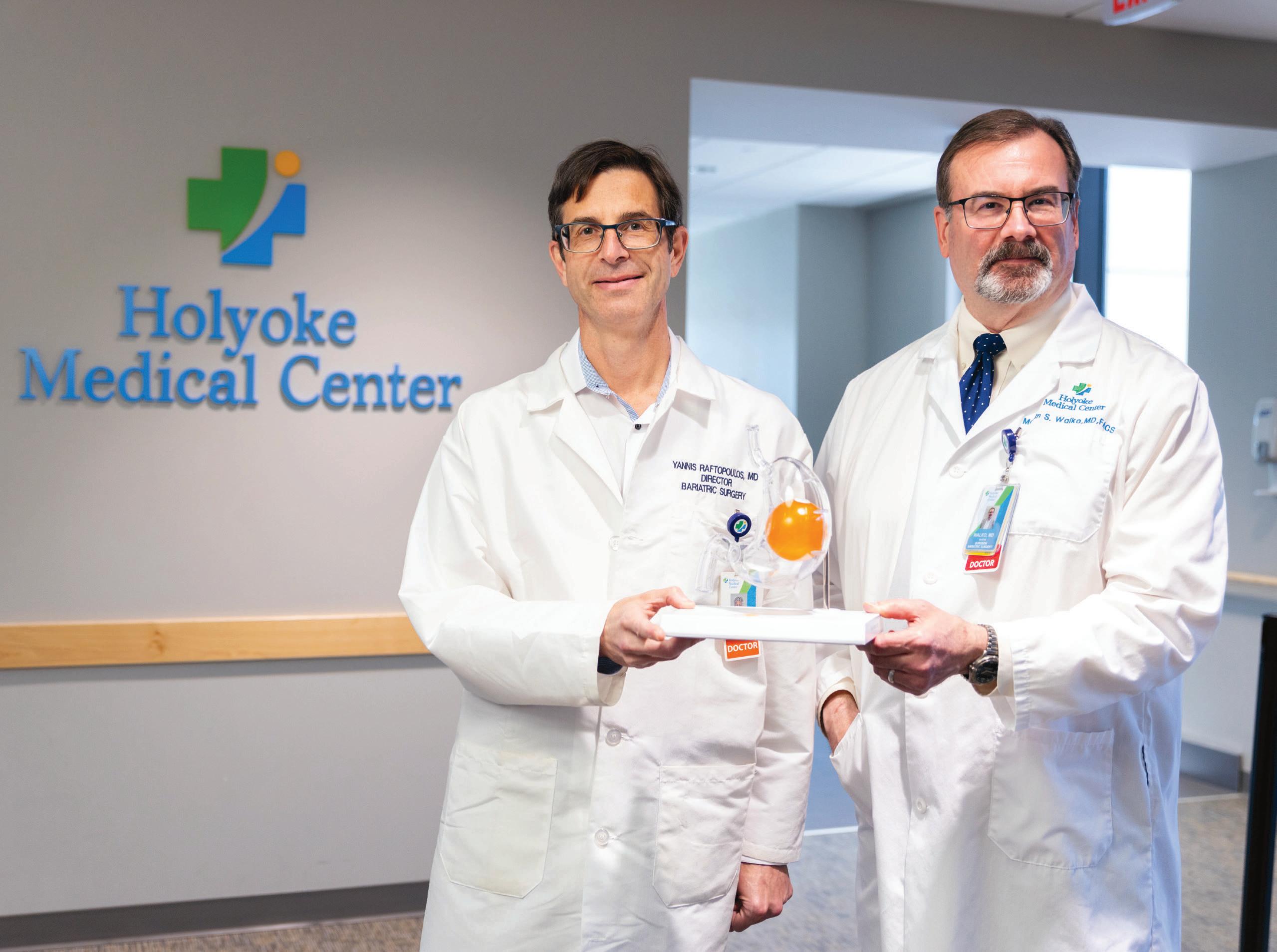
Because the balloon is placed through the esophagus using an instrument called an endoscope, the procedure doesn’t require surgery. “Unlike weight loss surgeries, which require an overnight hospital stay, gastric balloon procedures allow you to go home the same day,” says Martin Walko, MD, a fellowship-trained bariatric and laparoscopic surgeon with HMC’s Weight Management Program.
Filled with a sterile saline solution, the gastric balloon stays in the stomach for six months and is then carefully removed in a separate procedure. The temporary treatment
8 SUMMER 2023
Holding a model of a gastric balloon placed in a stomach are Yannis Raftopoulos, MD, PhD (left), and Martin Walko, MD.
can be especially beneficial for people who aren’t ideal candidates for bariatric surgery. “A minimally invasive gastric balloon procedure is the least invasive of effective weight loss methods available,” says Yannis Raftopoulos,
MD, PhD, Director
of the Weight Management Program.
A COMBINED APPROACH
A gastric balloon is designed to work together with lifestyle changes. “It’s not a magic bullet where you put in a balloon and everything is perfect,” Dr. Walko says. “It’s used as part of a program that includes education, proper diet and increased activity. Our program has extensive experience in lifestyle intervention and best-in-class weight loss results.”
Placing a gastric balloon helps patients see more dramatic results from lifestyle measures. Based on a study performed by Dr. Raftopoulos, who has extensive experience with gastric balloon therapy and led a Food and Drug Administration trial for gastric balloon therapy in the past, a gastric balloon doubles the weight loss achieved compared to lifestyle intervention alone. A gastric balloon also significantly reduces both the time required to achieve weight loss and the chances of dropping out of the program.
Taking steps to thwart obesity reduces risks of health problems related to excess weight and resulting inflammation, including cardiovascular disease, diabetes, many forms of cancer, obstructive sleep apnea and joint damage.
A gastric balloon works by taking up space in the stomach so there’s less room for food and by making the stomach empty slower so you feel full after eating less. The balloon also stretches the stomach, which helps signal the brain that you’ve eaten enough. “In a sense, the balloon tricks the brain into thinking you don’t have to eat as much,” Dr. Walko says.
Having the balloon in place allows patients to firm up practices that will make the biggest difference in the long run. “New habits usually take about three months to become ingrained,” Dr. Walko says. “After six months with a balloon, people have well-established diet and exercise patterns that can help keep weight off.”
“Our program is also committed to supporting our patients in the long run, helping them not only achieve the maximum weight loss possible at the beginning but also to maintain it later,” adds Dr. Raftopoulos.
‘ANOTHER TOOL’
The outpatient procedure to install a gastric balloon usually takes only 10 to 15 minutes. After the balloon is inserted, patients work on a weekly basis with the medical team at the Weight Management Program to fine-tune their eating plan and monitor for possible side effects such as temporary discomfort, bloating and nausea, which are readily managed with medications.
Gastric balloons have long been available in Europe and elsewhere in the world, where they’re proven to be generally
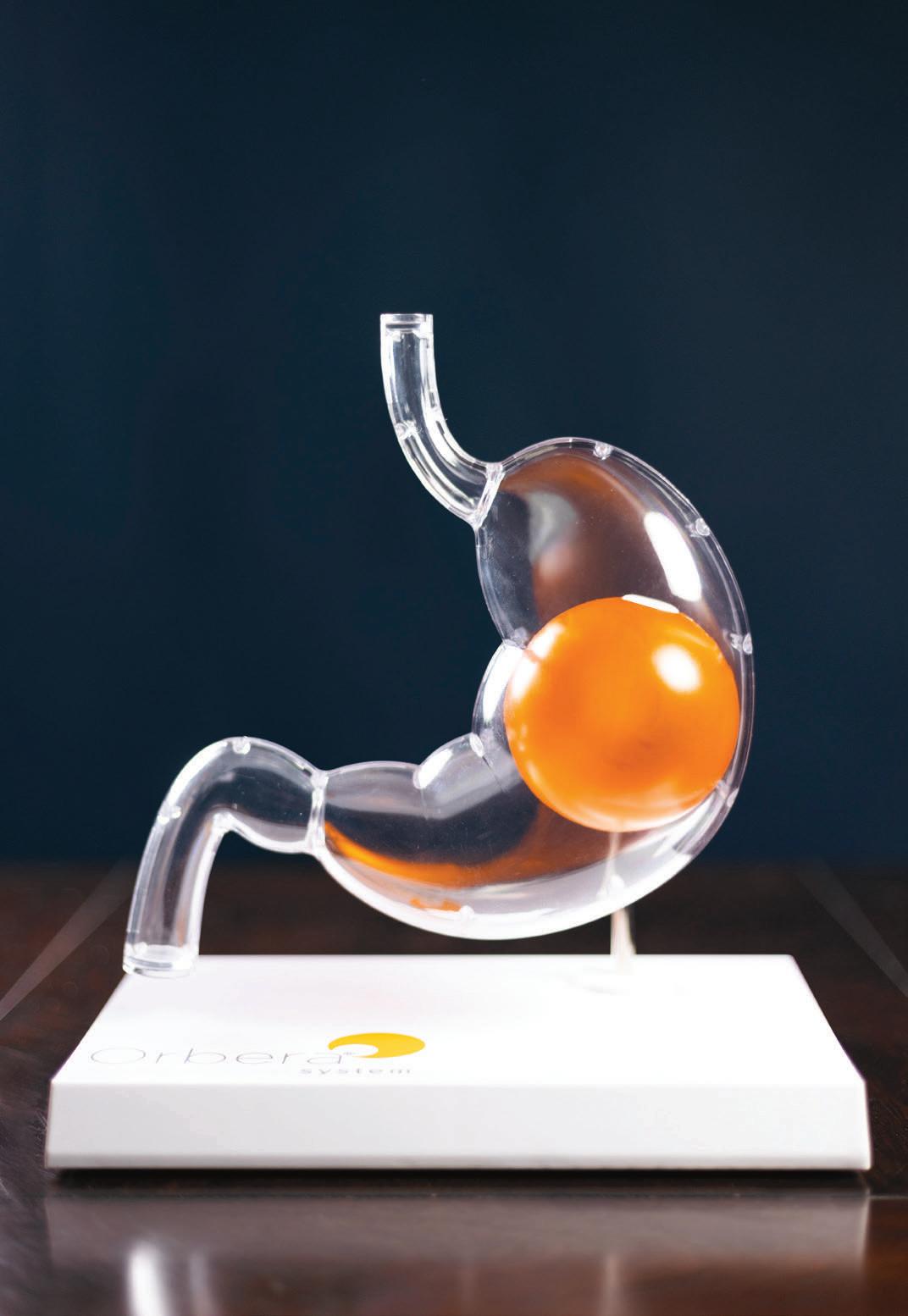
safe and effective. But their U.S. approval is relatively new, so insurance typically does not cover the procedure. Dr. Raftopoulos is one of the few physicians in the state with extensive international experience in gastric balloon therapy and has presented extensively in national and international meetings, been an invited speaker at seminars around the world and been the primary author of related studies in several peer-reviewed publications.
“The gastric balloon is another tool in the kit to address obesity,” Dr. Walko says. Based on Dr. Raftopoulos’s own results, patients who closely participate through the duration of HMC’s gastric balloon program are expected to lose at least 40 pounds or, on average, 20% of their initial body weight. “Patients who are motivated and fully engaged with the gastric balloon program may achieve weight loss comparable to that observed after weight loss surgery,” Dr. Raftopoulos says.
“Our program also has a unique expertise in providing remote follow-up, making it very easy to participate in this program even if you live far away from our location,” Dr. Raftopoulos continues. “Essentially, you will need to come to our center only twice, for the endoscopic placement and removal of the balloon six months later.”
To learn more, call the Holyoke Medical Center Weight Management Program at 413.535.4866
VALLEY HEALTH & LIFE 9
A gastric balloon facilitates weight loss during a six-month placement period and helps patients make lifestyle changes that persist after treatment.
WELCOMING NEW MEDICAL PROVIDERS
MEET 17 CLINICAL EXPERTS WHO HAVE JOINED HOLYOKE MEDICAL CENTER’S TEAM.
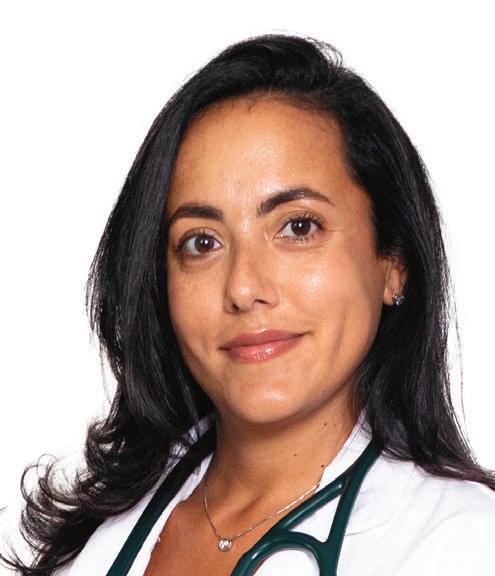
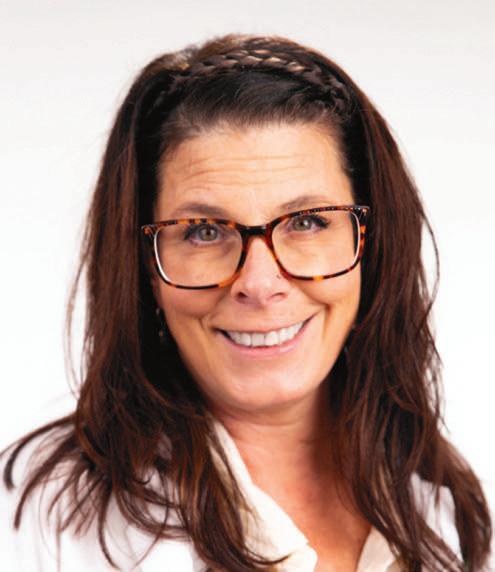
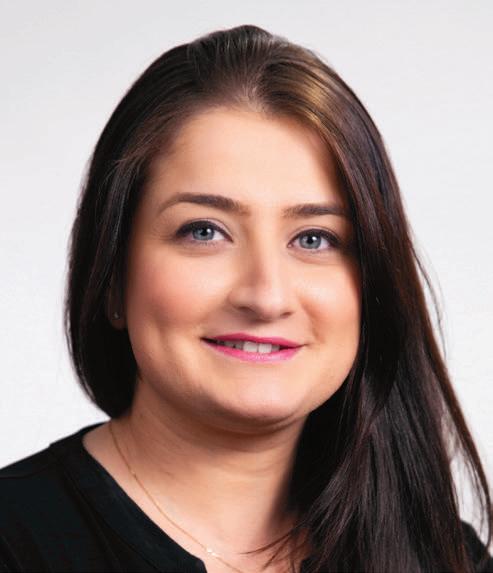
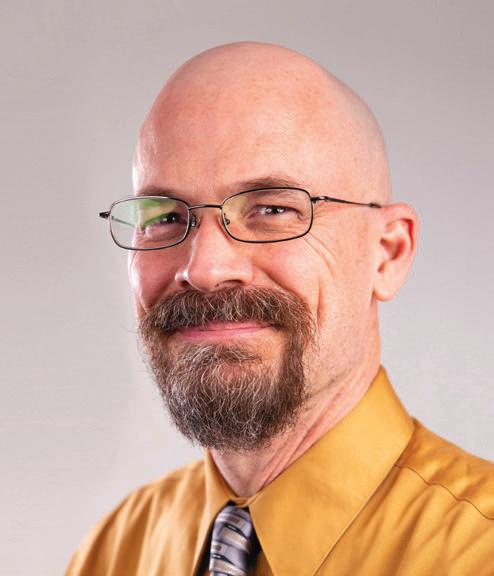
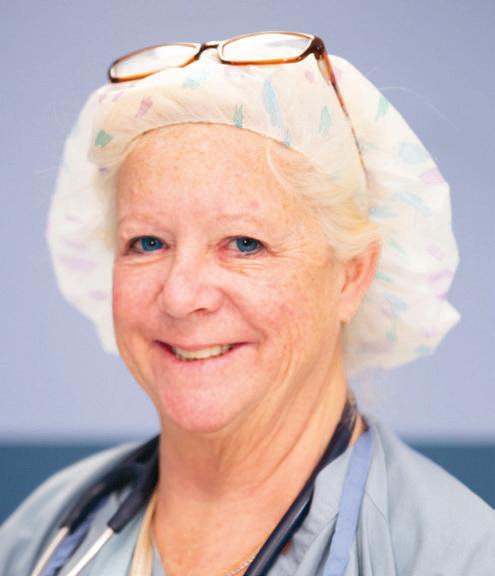
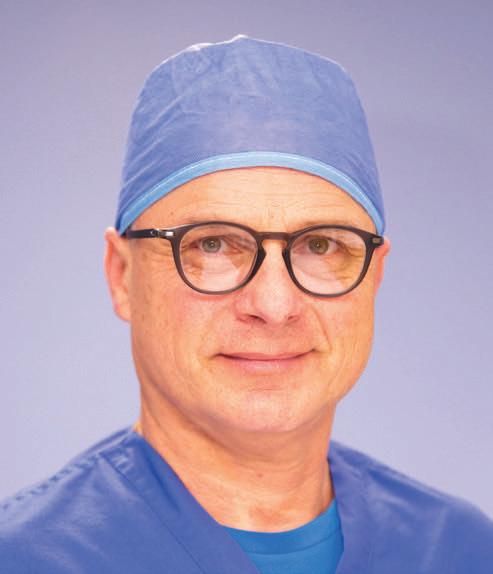
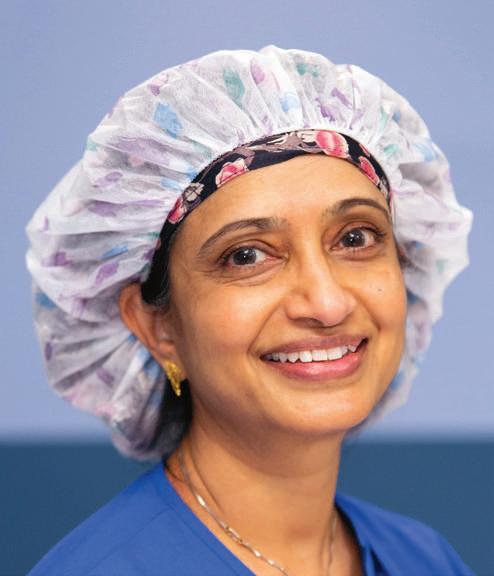
NEW INPATIENT PROVIDERS
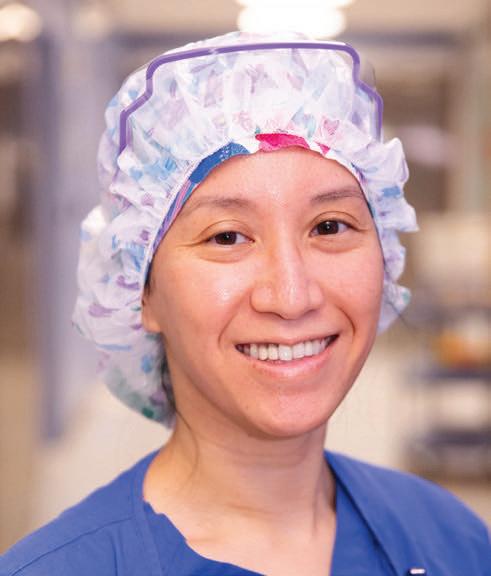 Christina Ly, DO ANESTHESIA
Lakshmi Madabhushi, MD ANESTHESIA
Istvan Pulai, MD ANESTHESIA
Karen Rafferty, MD ANESTHESIA
Kentston Bauman, PA-C HOSPITALIST
Daiana Khabir, PMHNP BEHAVIORAL HEALTH
Leslie Marshall, NP CRITICAL CARE
Christina Ly, DO ANESTHESIA
Lakshmi Madabhushi, MD ANESTHESIA
Istvan Pulai, MD ANESTHESIA
Karen Rafferty, MD ANESTHESIA
Kentston Bauman, PA-C HOSPITALIST
Daiana Khabir, PMHNP BEHAVIORAL HEALTH
Leslie Marshall, NP CRITICAL CARE
10 SUMMER 2023
Jessica Sanky Weir, CNP HOSPITALIST
NEW OUTPATIENT PROVIDERS
Corlis Archer-Goode, MD HMC UROLOGY CENTER 10 Hospital Drive, Suite 204, Holyoke 413.533.3912
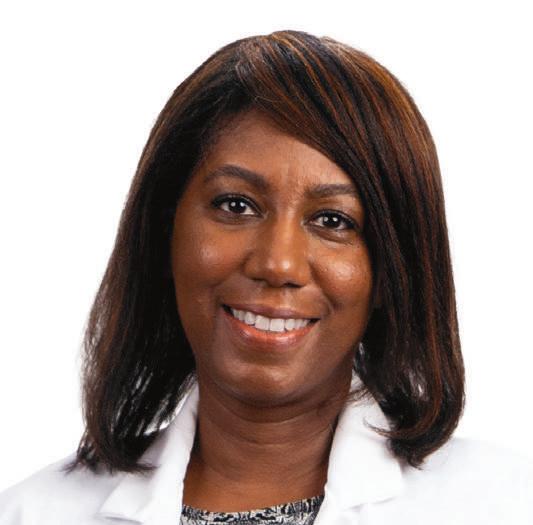
Frederik Pennings, MD, PhD THE INSTITUTE FOR MINIMALLY INVASIVE SPINE SURGERY 10 Hospital Drive, Suite 101, Holyoke 413.535.4860
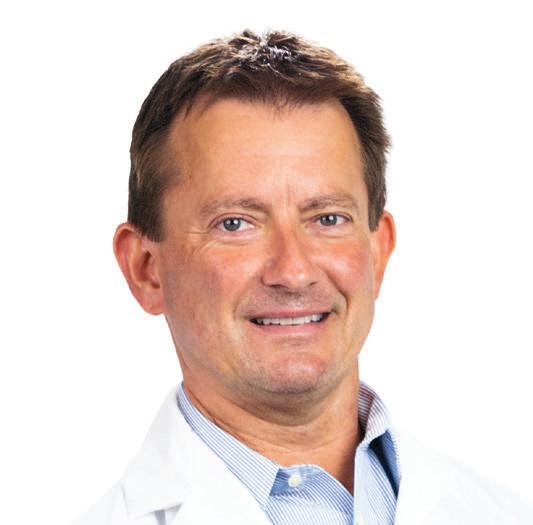
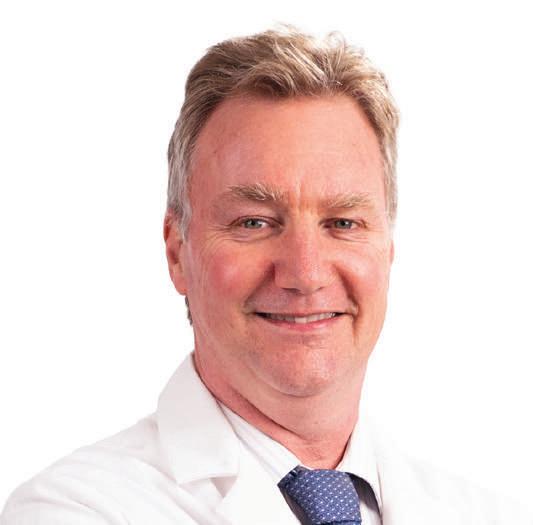
Pasquale (Pat) Rocco, MD HMC GENERAL AND SPECIALTY SURGEONS 11 Hospital Drive, 3rd Floor, Holyoke 413.532.1411
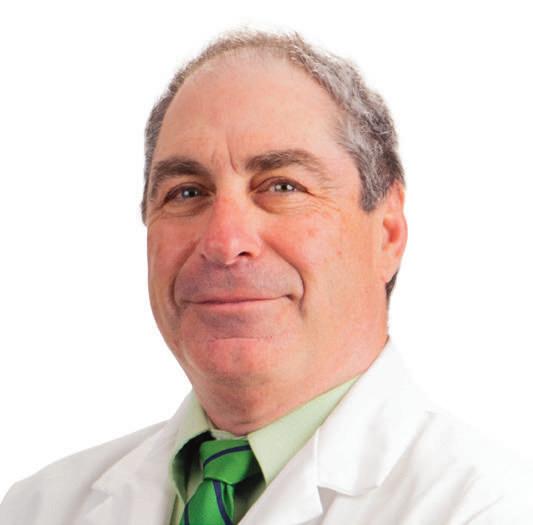
Daryle Ruark, MD HMC ORTHOPEDIC CENTER 10 Hospital Drive, Suite 203 413.536.5814
Michael Bennett, PA-C THE INSTITUTE FOR MINIMALLY INVASIVE SPINE SURGERY 10 Hospital Drive, Suite 101, Holyoke 413.535.4860
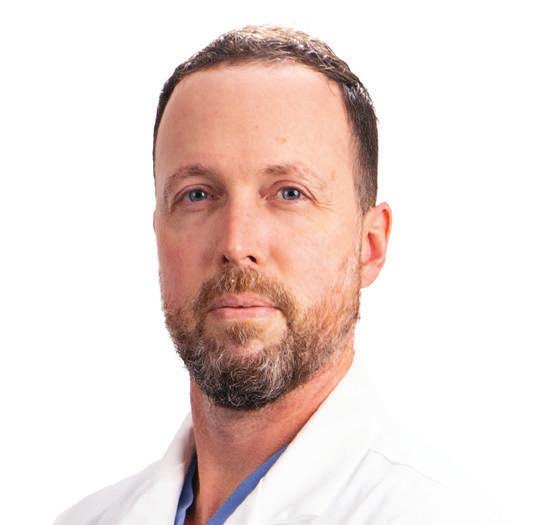
Kimberly Brown, PA-C HMG PEDIATRIC CARE 10 Hospital Drive, Suite 201, Holyoke 413.534.2800
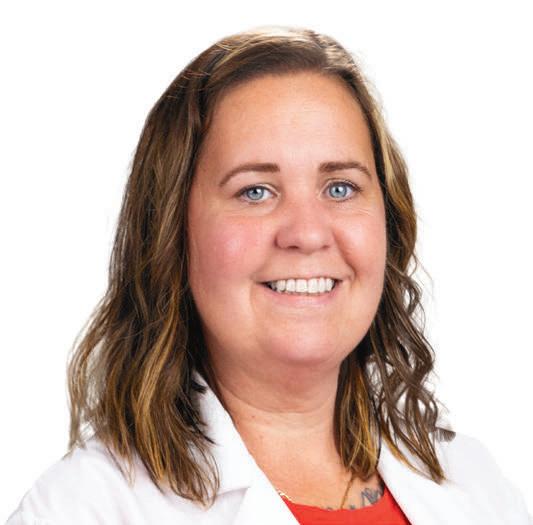
Kelly Hayward, NP HMC PAIN MANAGEMENT CENTER 10 Hospital Drive, Suite 205, Holyoke 413.535.4933
Amie Matos, NP HMC UROLOGY CENTER 10 Hospital Drive, Suite 204, Holyoke 413.533.3912
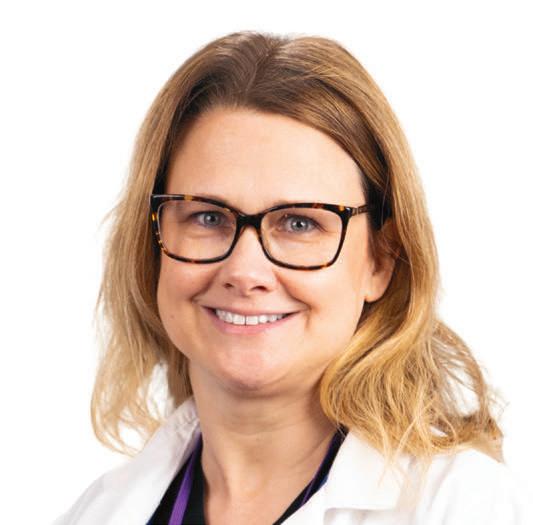
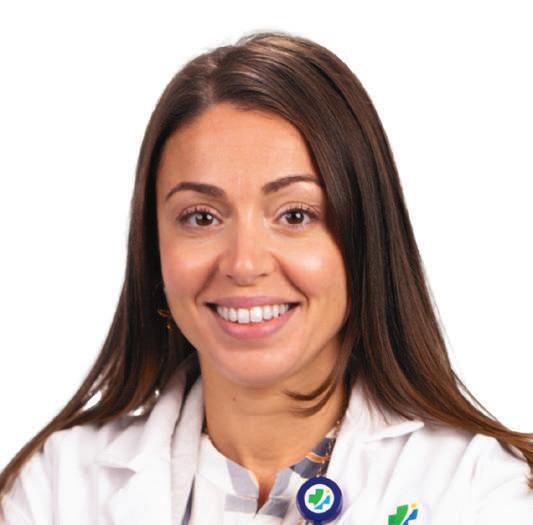
Jodi Ripka, NP HOLYOKE HIGH SCHOOL TEEN CLINIC (For enrolled students only) 413.534.2033
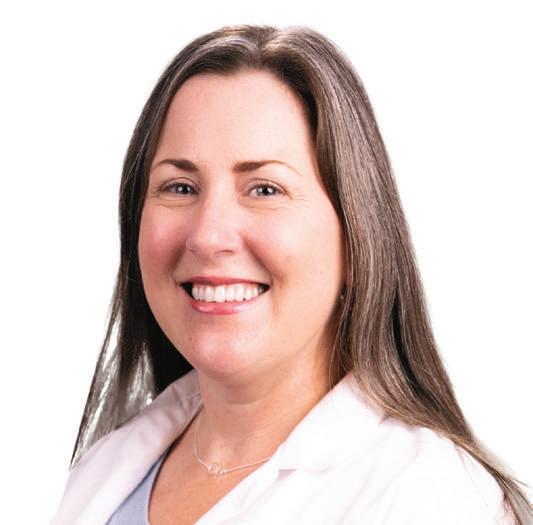
VALLEY HEALTH & LIFE 11
CHAPLAINS:
INTERFAITH VOLUNTEERS OFFER BLESSINGS AND LISTENING EARS TO PATIENTS AND STAFF ALIKE.
ALYCIA DABROWSKI, RN, had seen volunteer interfaith chaplains at Holyoke Medical Center (HMC) serve her patients in the hospital’s medical surgical unit. “If, for example, patients were experiencing distress, going through a hard time or getting close to passing, chaplains would spend time, talk, address concerns and help ease their minds,” she says.
But in fall 2022, chaplaincy services became even more personal for Dabrowski. “My grandmother was
admitted to the hospital and was nearing the end of her life,” she says.
Chaplains visited Dabrowski’s grandmother at least once a day. “Even if semi-alert, she understood that they were there helping with her needs and making that transition a little easier,” Dabrowski says. “They also made sure I was OK, and that meant the world to me. If I needed a cup of coffee, a bite to eat or—because it was a hard time—to step away, they were always able to offer something.” At times, chaplains
would provide a hug or support Dabrowski if she needed to cry.
When Dabrowski’s grandmother eventually died, hospital chaplains continued to check how Dabrowski was doing. “They were amazing,” she says.
PROVIDING HOLISTIC CARE
Volunteer interfaith chaplains are available for anybody in the hospital who wants their services. “Our role is to be there every day, show people that their lives matter, let them know that
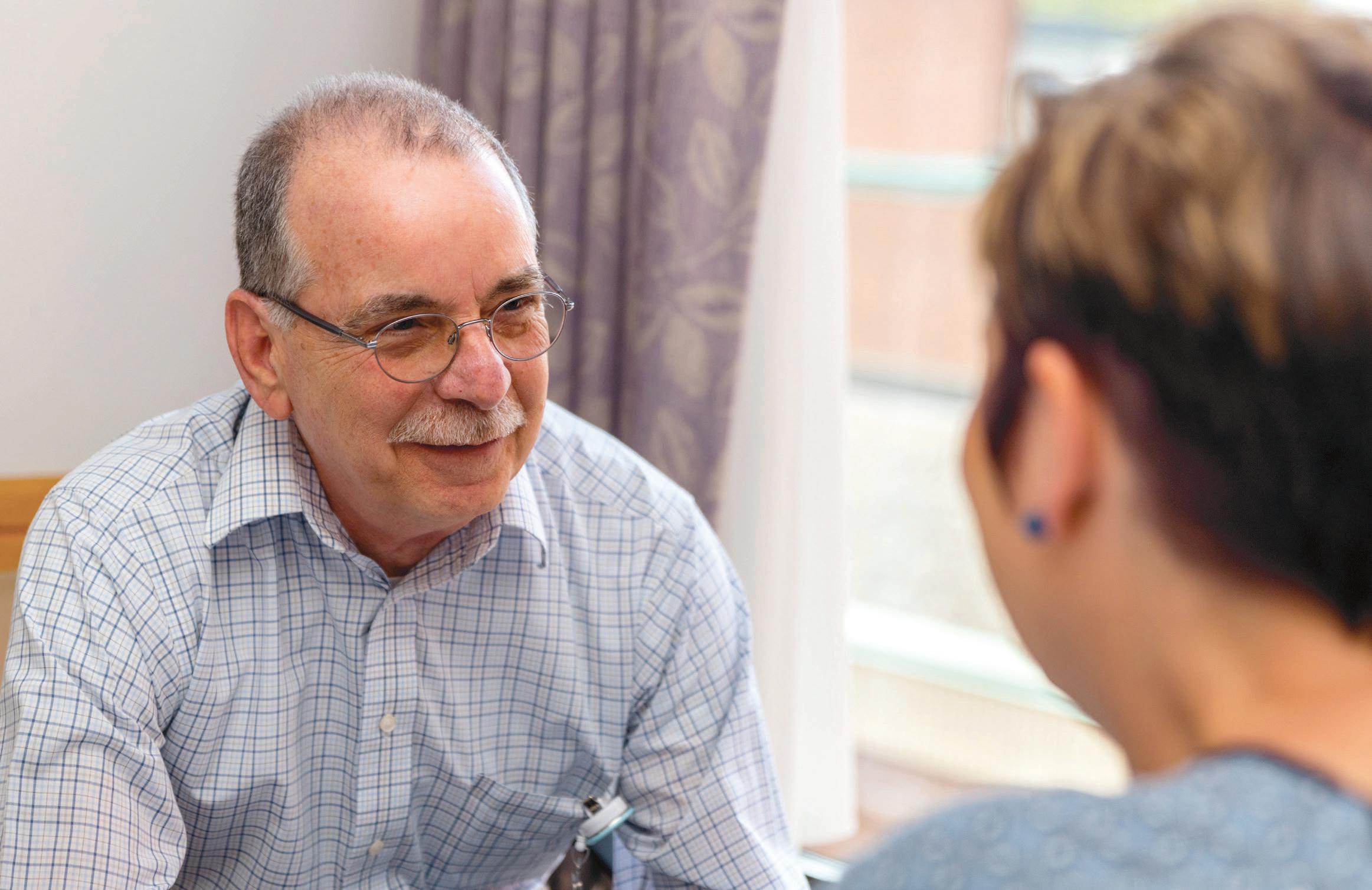 Interfaith chaplain Joe DeGrande speaks with a patient.
Interfaith chaplain Joe DeGrande speaks with a patient.
A SOURCE OF CALM AND COMFORT 12 SUMMER 2023
they’re not alone, share their pain and help them take whatever journey they’re on,” says HMC volunteer chaplain Joe DeGrande. “We try to find that place where they reach peace.”
“We emphasize that we’re intentionally interfaith because people may have very different faith traditions— or no faith tradition at all—but share a desire for nourishment of the human spirit,” says Lorain Giles, another HMC volunteer chaplain. “That’s what we seek to offer along with companionship and listening.” If patients prefer to be served by clergy from their own tradition, chaplains help arrange a visit.
Nourishment of the spirit is one foundation of a holistic approach to health and wellness that HMC embraces. “We are whole beings, not separated out,” Giles says. “The wellness of our spirits deeply affects our emotional, mental and physical health, and healthcare in a hospital setting is as much about care of the spirit as it is about medical well-being.”
That’s true not only for patients and families but also staff. “Providers have told me that they can seem like a well-oiled machine,” DeGrande says. “Everyone has their job, and it might look like emotions don’t come into play. But when that call is over, emotions come back and hit them hard. It’s a side of medical professionals that people don’t normally see.”
BLESSINGS ALL AROUND
Patients and families might consult a chaplain for reasons that cover the gamut of human experience—such as when facing surgery; grappling with a difficult medical or ethical decision; searching for comfort, encouragement or reassurance; grieving loss; feeling alone; seeking a blessing or sacramental ministry; or just wanting a listening ear.
Clinicians might appreciate a chaplain’s services for the same reasons—but also when they’ve faced a difficult case; had an intensely emotional interaction with a patient or family; feel burned out or depressed; have a sense of compassion fatigue; or are making a transition in their work or personal lives.
Giles recalls one family holding a loving vigil for a patient who was near the end of life. “I invited them to share stories of the loved one who was lying in bed, and they started talking and remembering,” Giles says. “I sat with them for quite a while, and when it was time for me to leave, they thanked me and said, ‘Without you, we wouldn’t have shared these stories, and that really helped.’”
In some cases, prayers, blessings and companionship come full circle, says DeGrande, citing two difficult cases involving children in which talking or praying with families and staff helped
ease pain—including his own—that they all shared. “Blessings come from many different directions,” he says.
Chaplains respect boundaries and let people guide interactions. “We create a relationship of trust,” DeGrande says. “We honor people for who they are, exactly where they are.” In some cases, no words are needed. “Sometimes people are not ready to absorb or hear anything,” he says. “It can be enough to just be there so they’re not alone. To know that someone cares can mean a lot.”
Patients can request a chaplain, and clinical staff offer recommendations on people who may benefit from a visit. In urgent situations, “the entire clinical staff knows how to reach us through the hospital switchboard,” Giles says.
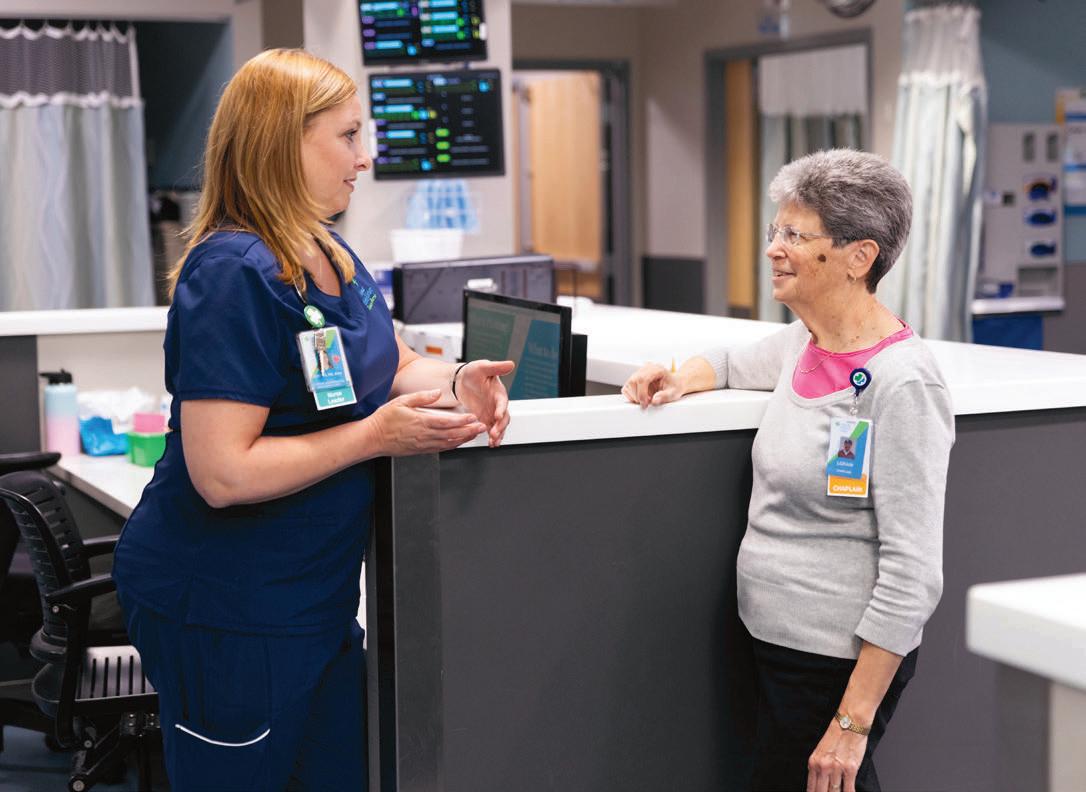
Six chaplains currently serve HMC, but the program is seeking additional qualified volunteers who have relevant experience honoring patients of diverse faith traditions and beliefs. Having completed a Clinical Pastoral Education program is a plus, but all volunteer chaplain candidates go through an HMC onboarding process and orientation.
“The chaplains who helped me were very genuine,” Dabrowski says. “You could tell they really meant what they were saying and love what they do. You could see in their eyes and faces that they really care.”
To learn more about becoming a volunteer chaplain at Holyoke Medical Center or to apply, contact Laura Ciejka at 413.534.2510 or email ciejka_laura@holyokehealth.com
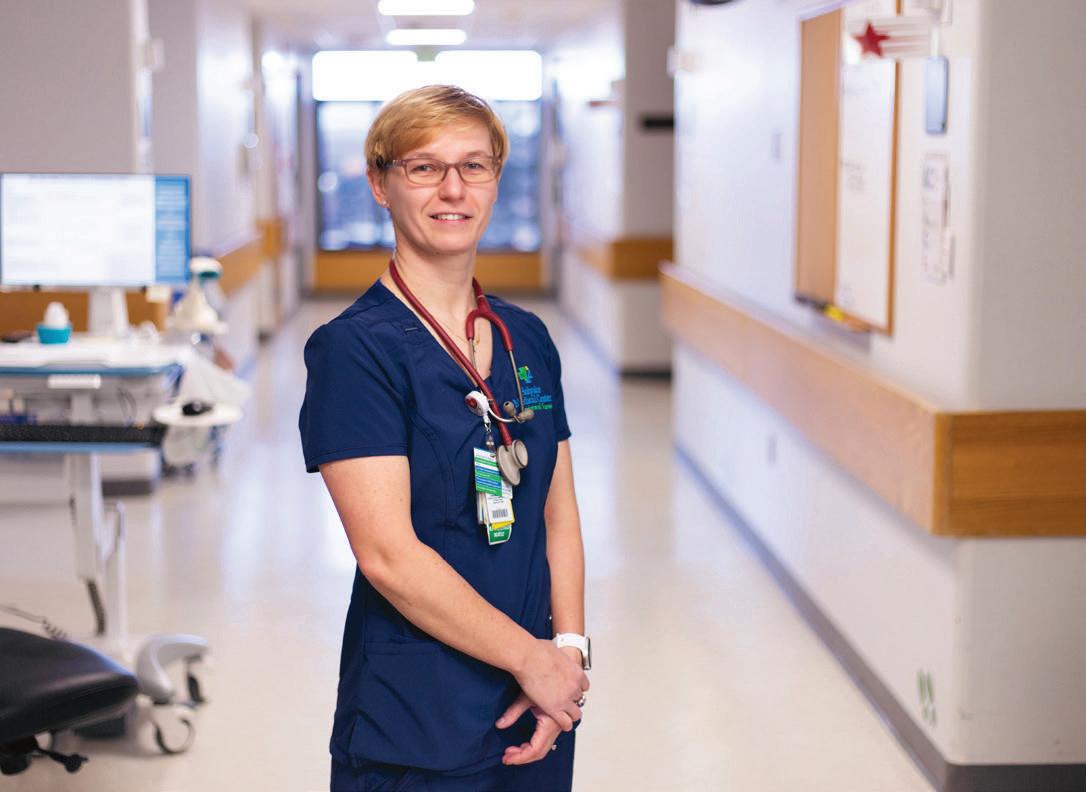 Interfaith chaplain Lorain Giles (right) talks with Jessica Youmell, RN, ED, Clinical Coordinator.
Interfaith chaplain Lorain Giles (right) talks with Jessica Youmell, RN, ED, Clinical Coordinator.
VALLEY HEALTH & LIFE 13
Alycia Dabrowski, RN, has seen firsthand how chaplains benefit both patients and staff.
PROVIDING HANDS-ON HELP
A DOCTOR OF NURSING PRACTICE WORKS TO IMPROVE HIS HOMELAND THROUGH ON-SITE HEALTHCARE AND EDUCATION.
MOHAMED TURAY, DNP, FNP, was ready for higher education when he came to the United States from Sierra Leone in 2002. “Subjects like algebra and statistics for nursing training were a breeze for me because I had been prepared in high school,” says Turay, who eventually became a doctor of nursing practice and is now on staff at Holyoke Medical Group.
To Turay, education and good community healthcare go hand in hand. But education has deteriorated in Sierra Leone since his days growing up in the capital city of Freetown, he says—an outcome of destabilizing disruptions including civil war, tribalism, an Ebola virus epidemic and a 2017 mudflow disaster that killed more than a thousand people.
“From an early age, I knew I wanted to be a healthcare provider—and I wanted to help my home country and my people,” says Turay, who notes
that Sierra Leone has among the world’s highest rates of infant and maternal mortality. “But me being a provider alone won’t achieve the greater good. For that, I also want to educate.”
CONTRIBUTING IN-COUNTRY
In December 2022, Turay visited Sierra Leone to further both missions, spending a week at each of two locations. The first was Bandawa Community Center Clinic, which serves about 11,000 people in a district of villages near the south-central city of Bo Town. The second was Liberty Academy, a school in Freetown that Turay founded in 2015.
Turay connected with the Bandawa clinic through a younger friend and mentee whose father, a pastor, owns and manages the facility. As
Education and healthcare go hand in hand, says Mohamed Turay, DNP, FNP, who founded a school (left) and has worked at a clinic (below) in his native Sierra Leone.
Turay treated conditions such as malaria, typhoid, viral diseases, upper respiratory symptoms and gynecologic issues, he saw the challenges of delivering healthcare in Sierra Leone firsthand.
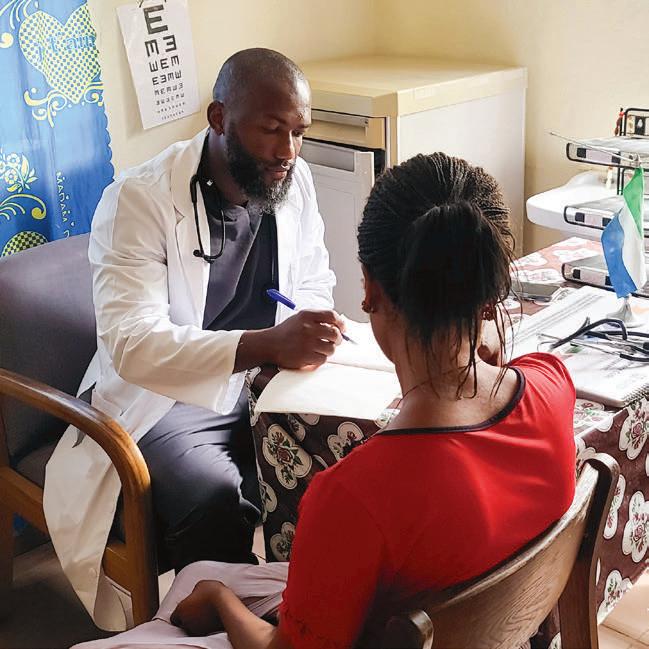
Among them were lack of medical equipment, staffing—the clinic has no regular doctor—and community education about preventive care or health promotion. But perhaps the biggest challenge was lack of diagnostic labs and imaging. “You can’t treat what you don’t know,” Turay says. “Healthcare shouldn’t be a guessing game.”
Still, he was impressed that chief medical officers, community health workers and others on-site were well versed in processes such as gathering information through patient history and physical examination.
“Communication was smoother than I expected,”
Turay says. “I didn’t have to overexplain. That’s huge.” It confirmed to him that there’s hope. “If we have the resources, people are there who can do the work, and we can join them,” he says.
Turay envisions the roughly 320 students who attend his Liberty Academy from kindergarten through senior high—and produce competitive test scores—contributing to the nation’s future and one day having access to a clinic at the school. He’s planning and raising funds to build expanded, permanent structures on-site.
“My goal is to make quality and affordable education available to kids regardless of background,” he says. “Helping people—whether doing healthcare or education—is what I live for.”
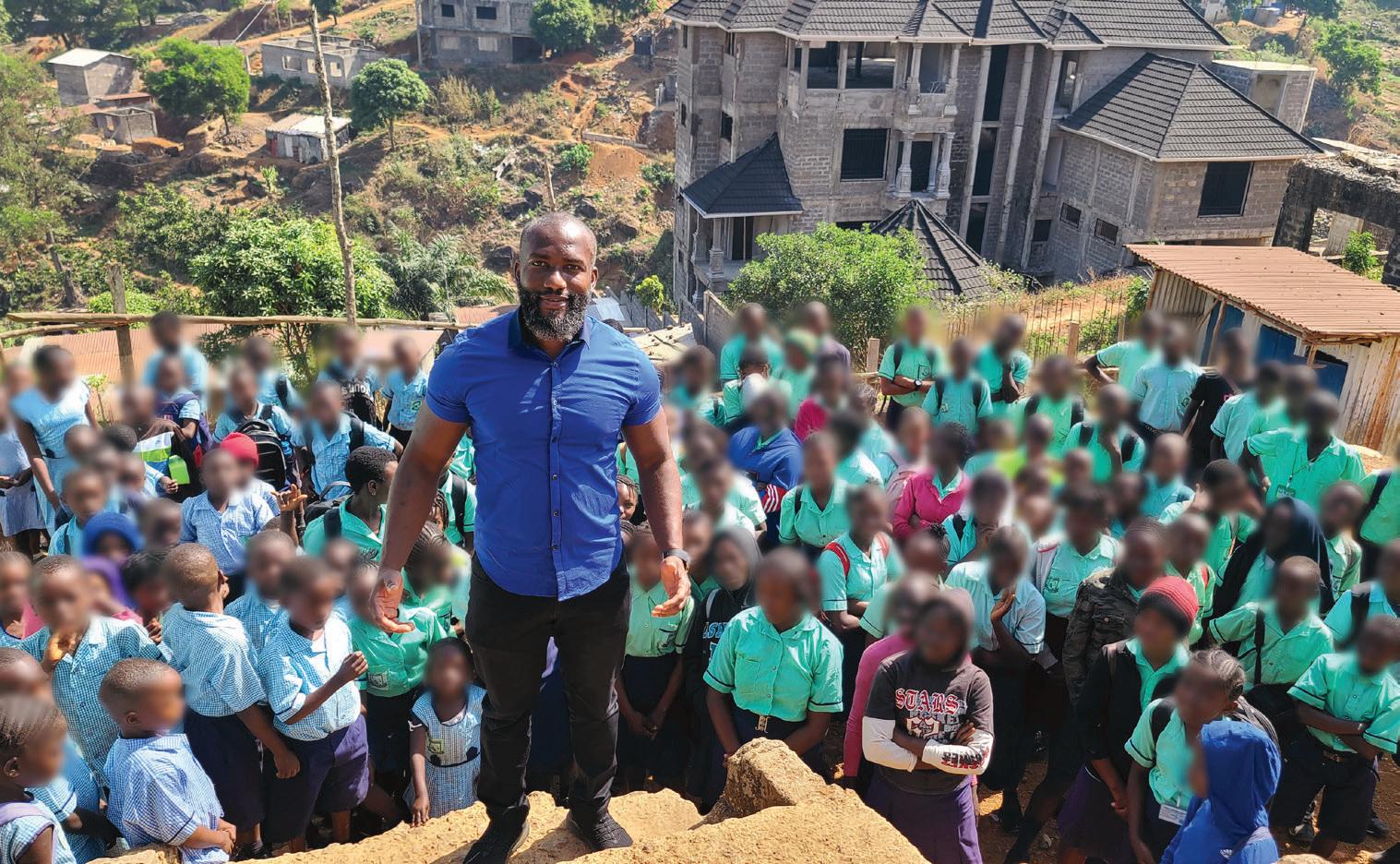 Mohamed Turay, DNP, FNP, practices at Holyoke Medical Group Family Medicine, located at 140 Southampton Road, Westfield. To schedule an appointment, call 413.535.4800
Mohamed Turay, DNP, FNP, practices at Holyoke Medical Group Family Medicine, located at 140 Southampton Road, Westfield. To schedule an appointment, call 413.535.4800
14 SUMMER 2023
ONE YEAR OF COMMUNITY BENEFITS
HMC IMPROVED AREA HEALTH IN 2022 WITH PROGRAMS AND SERVICES LIKE THESE.
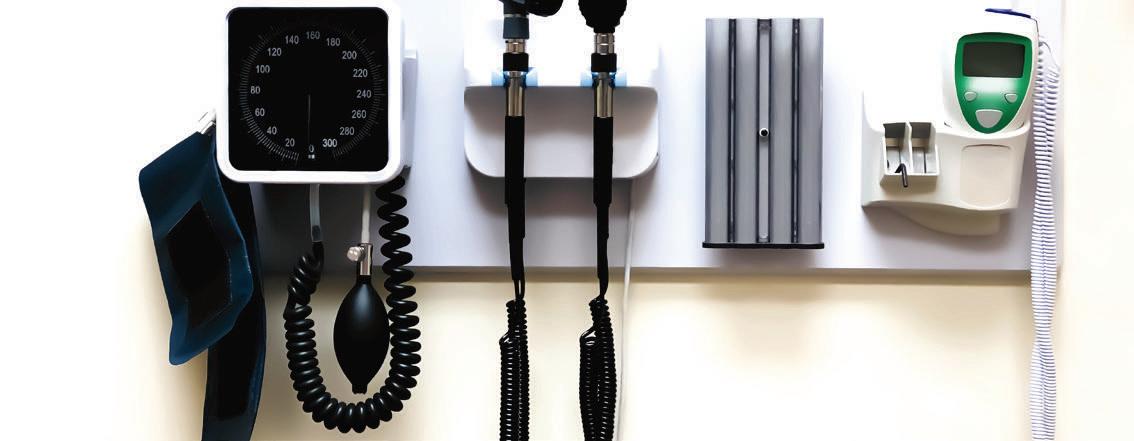
13,000
Provided 13,000 THRIVE screenings (which measure social determinants of health) and referred those in need to resources.
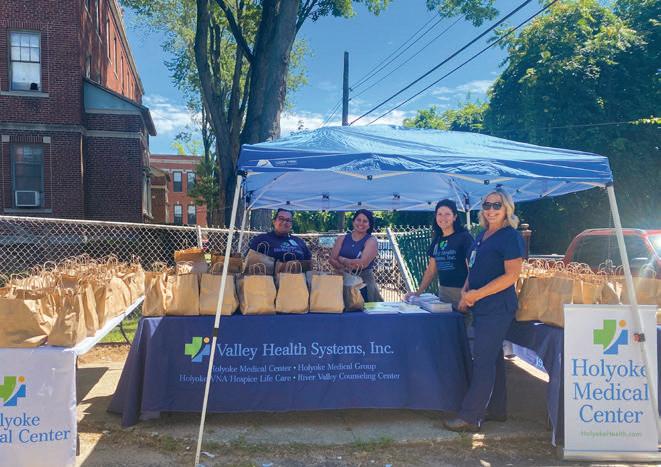
2,800
Served over 2,800 meals to community members in need.
Completed the 2022 Community Health Needs Assessment. To check out the results, scan this code:

$12.5 million

Made total Community Benefits expenditures of $12.5 million, or 7% of net patient services revenue.
18,000
Provided free transportation to the hospital for over 18,000 patients.
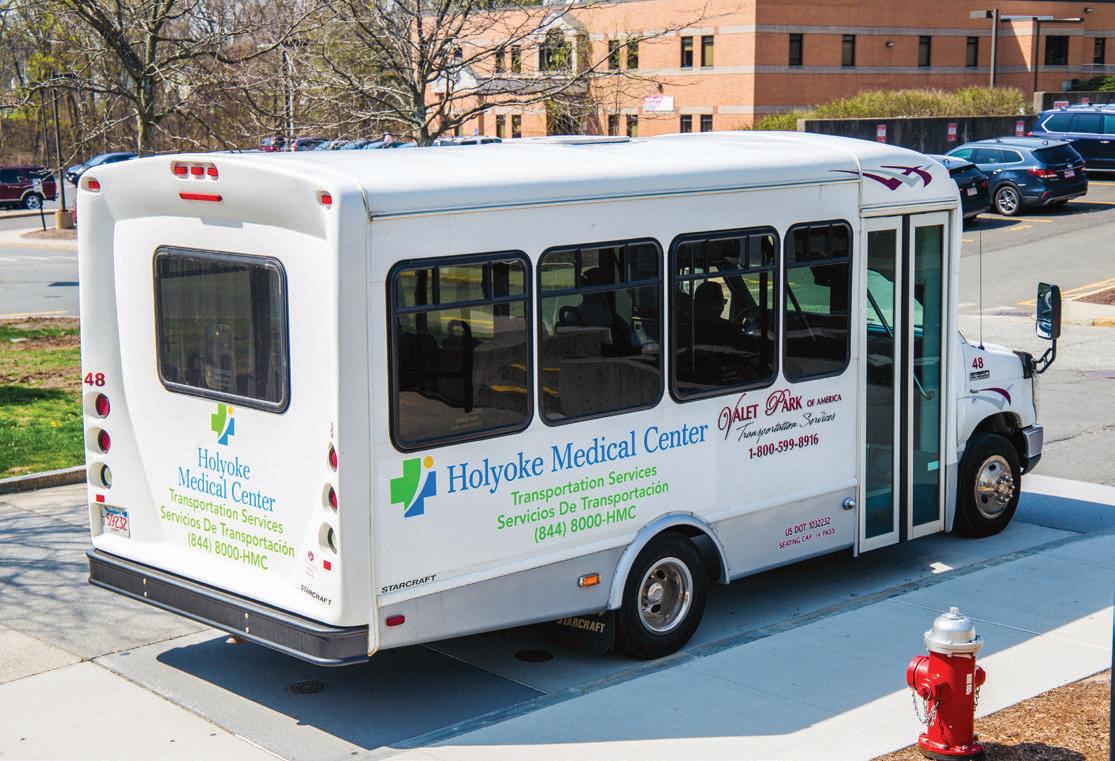
Invested over 2,500 hours in nursing student internships.
HMC physicians and advanced practice providers spent nearly 3,000 hours training nurse practitioner and physician assistant students.
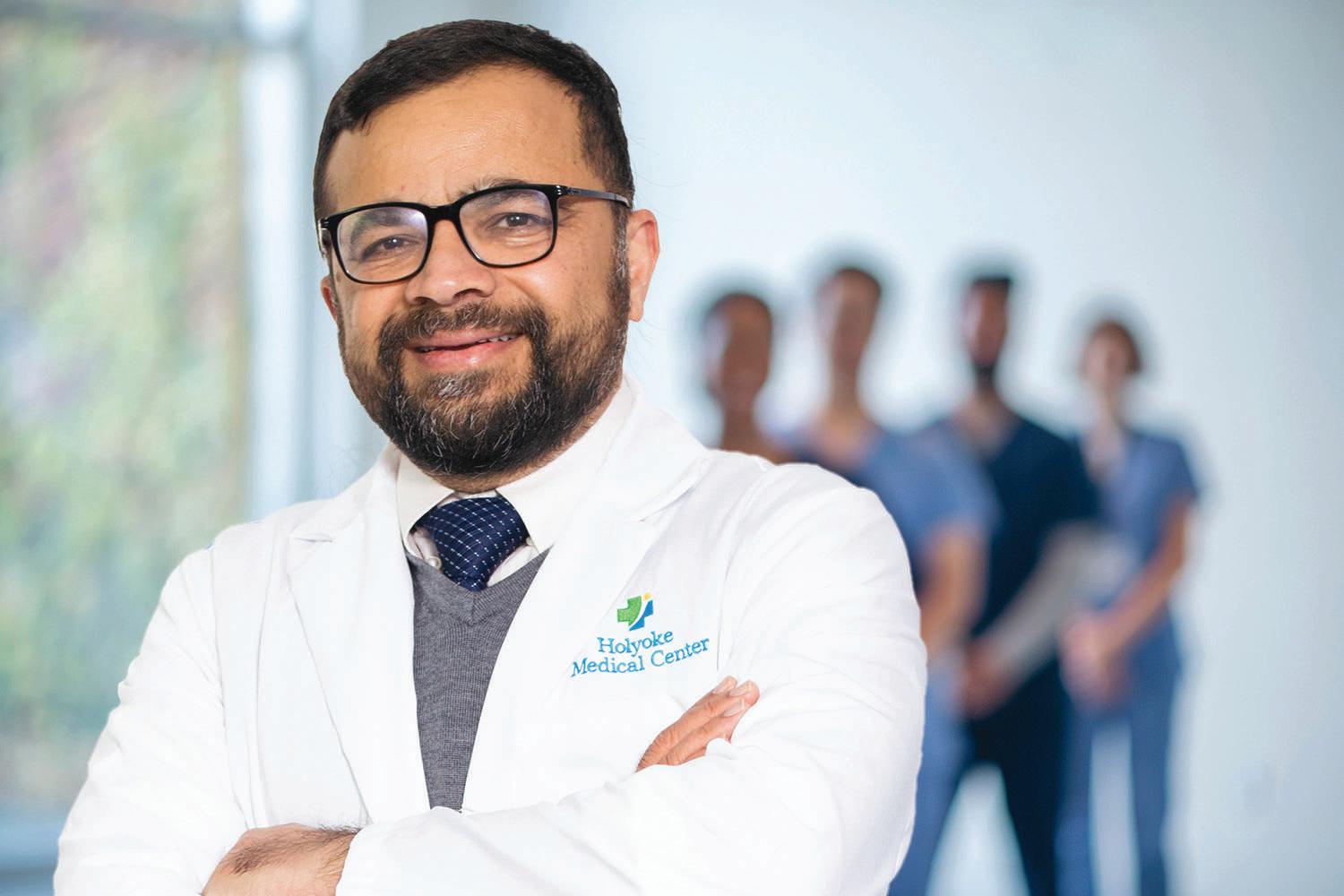
40,000
Provided 40,000 interpretive services encounters in 43 languages.
500 Helped over 500 people access healthcare insurance with financial counseling services.
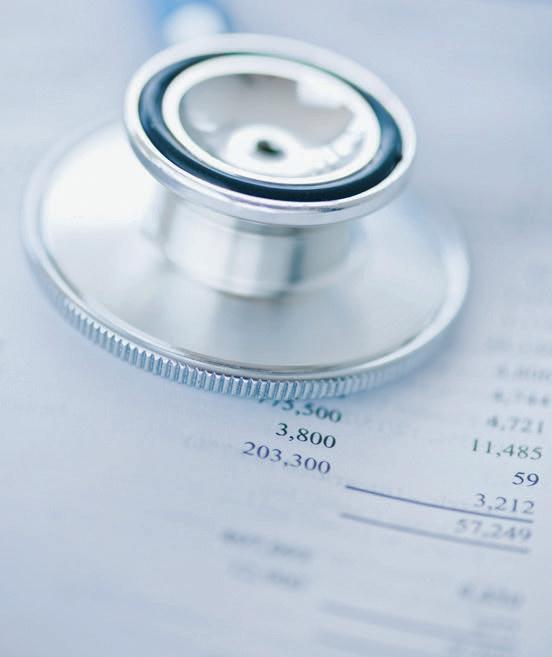
VALLEY HEALTH & LIFE 15
MAJOR RELIEF. MINOR INCISION.
We Treat What Others Can’t.
A small incision can make all the difference in relieving severe or debilitating back pain. The Institute for Minimally Invasive Spine Surgery has the expertise in providing a comprehensive array of Minimally Invasive Spine Surgical procedures, the majority on an outpatient basis. With less pain and a quicker recovery. Led by neurosurgeon Frederik Pennings, MD, PhD, a minimally invasive spine surgeon innovator with 25+ years’ experience, our spine surgery team can diagnose, treat, and provide relief for a host of complex conditions.
Get the best options tailored to relieve your spine and back pain. Book your appointment by calling 413.535.4860.
The Institute for Minimally Invasive Spine Surgery
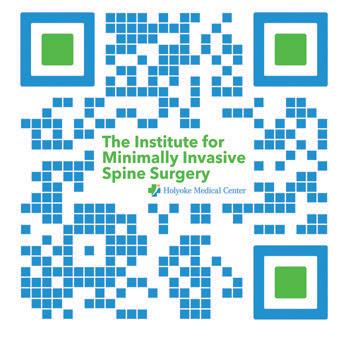



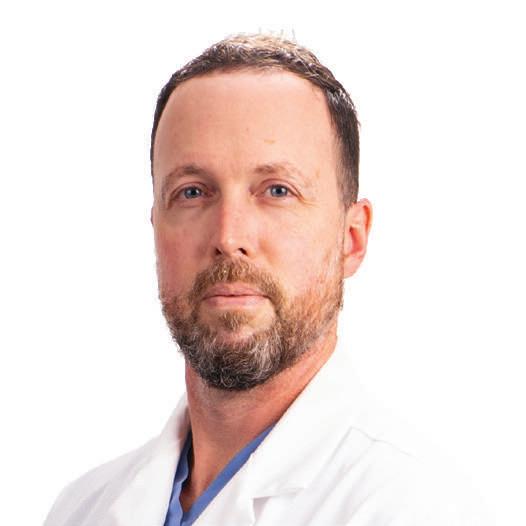
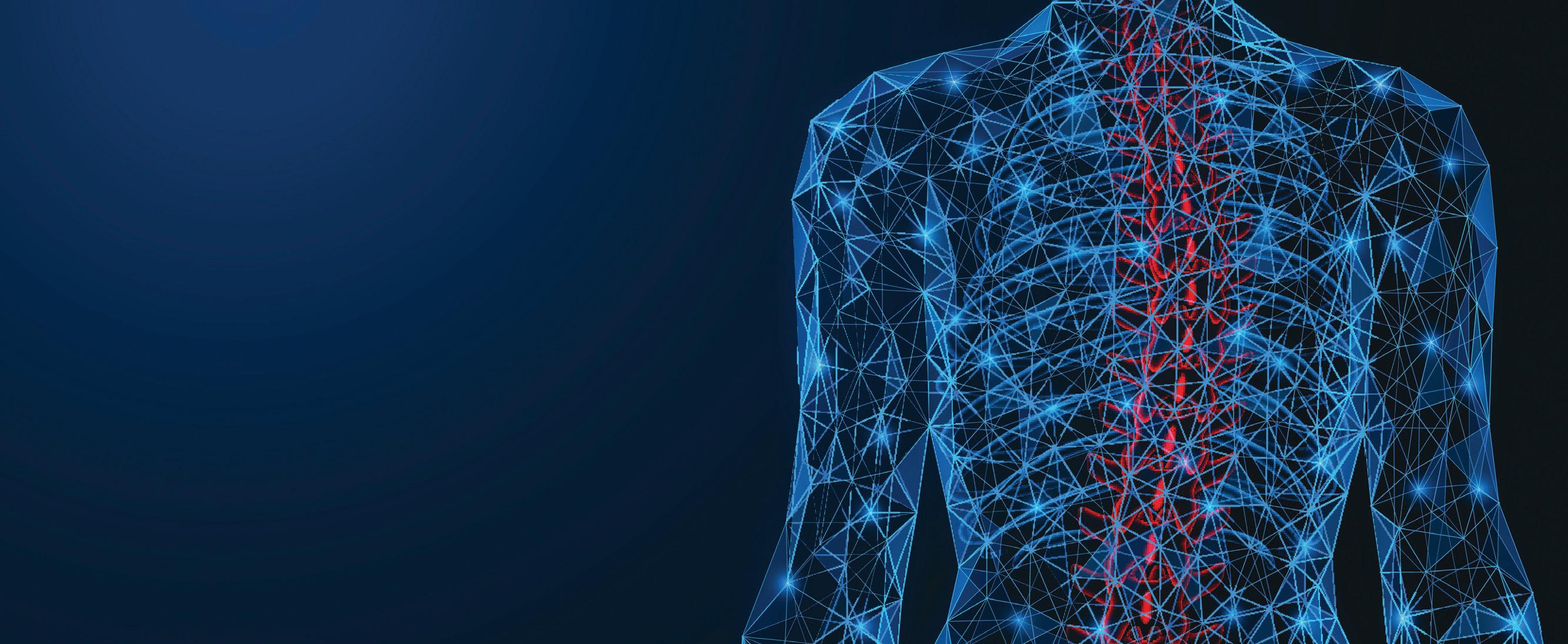 Michael Bennett, PA-C
Frederik Pennings, MD, PhD
Michael Bennett, PA-C
Frederik Pennings, MD, PhD
HolyokeHealth.com/spine
Beech Street Holyoke, MA
NON PROFIT U.S. POSTAGE PAID Harrisburg, PA Permit #324
575
01040

























 Christina Ly, DO ANESTHESIA
Lakshmi Madabhushi, MD ANESTHESIA
Istvan Pulai, MD ANESTHESIA
Karen Rafferty, MD ANESTHESIA
Kentston Bauman, PA-C HOSPITALIST
Daiana Khabir, PMHNP BEHAVIORAL HEALTH
Leslie Marshall, NP CRITICAL CARE
Christina Ly, DO ANESTHESIA
Lakshmi Madabhushi, MD ANESTHESIA
Istvan Pulai, MD ANESTHESIA
Karen Rafferty, MD ANESTHESIA
Kentston Bauman, PA-C HOSPITALIST
Daiana Khabir, PMHNP BEHAVIORAL HEALTH
Leslie Marshall, NP CRITICAL CARE









 Interfaith chaplain Joe DeGrande speaks with a patient.
Interfaith chaplain Joe DeGrande speaks with a patient.

 Interfaith chaplain Lorain Giles (right) talks with Jessica Youmell, RN, ED, Clinical Coordinator.
Interfaith chaplain Lorain Giles (right) talks with Jessica Youmell, RN, ED, Clinical Coordinator.

 Mohamed Turay, DNP, FNP, practices at Holyoke Medical Group Family Medicine, located at 140 Southampton Road, Westfield. To schedule an appointment, call 413.535.4800
Mohamed Turay, DNP, FNP, practices at Holyoke Medical Group Family Medicine, located at 140 Southampton Road, Westfield. To schedule an appointment, call 413.535.4800










 Michael Bennett, PA-C
Frederik Pennings, MD, PhD
Michael Bennett, PA-C
Frederik Pennings, MD, PhD